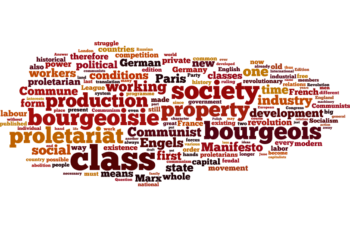In over 4 years of blogging, I’ve discussed lots of terminology, especially leftist terminology. I try to use terms in a consistent way that people within leftist debates understand.
However, like all analytic philosophers, I occasionally see the need to clarify terms. Some terms stand in need of tidying. Some of them a lot of it. Every now and then, I provide new (and hopefully better!) definitions for familiar terms. And at other times, I use more obscure terms, repurpose terms for new uses, or just create new ones.
And so, I find a need for a blog lexicon! I’ll use this post as an opportunity to collect lots of these terms in the same place. As a bonus, if I introduce additional terms in the future, I can add them to the lexicon.
A Base and Superstructure Lexicon
Afropessimism:
an identitarian viewpoint that reduces all political and social life to race, specifically anti-black racism, leading to nihilism and despair. See also: identitarianism.
Base and Superstructure:
two major groups or kinds of social forces. The base includes the means of production along with economic classes and relationships. The superstructure includes religion, philosophy, culture, et al. While the base and superstructure interact, the base plays a foundational role in society.
Class:
a system of mostly antagonistic relationships between economic groups (e.g., workers and bosses), relationships that concern the ownership and control of economic resources. See also: working class.
Fascism:
a system that arises during times of serious capitalist crises, including economic breakdown and leftist threats to the capitalist order; an emergency management mode of capitalism that attempts to save capitalism from itself.
Identity Politics:
any politics aimed at advancing the interests of an identity group. Identity groups include, e.g., race, gender, and sexuality, but not class. See also: class.
Identitarianism:
any politics or movement that reduces issues entirely or almost entirely to issues of identity. This goes beyond most forms of identity politics and has a tendency to slide into nihilistic movements, e.g., Afropessimism.
Intersectionality:
a method of thinking about and doing politics that stresses the ways overlapping identities, e.g., race, gender, and sexuality, affect people’s experiences and struggles.
Pied Piper:
an enthusiastic, usually young, often student leftist who wants to lead local activist groups but lacks the relevant expertise, skills, and leadership abilities to do so.
Progressivism:
a movement of highly educated and/or wealthy Americans who profess very liberal attitudes and focus on process reform and noblesse oblige for the poor rather than organizing working-class people and other marginalized groups. See also: ultra-progressives.
Radlib:
someone who uses radical or leftist language to advance or defend non-radical, non-leftist ideas, usually ideas that don’t differ in any significant way from ideas already found in mainstream politics.
Sandersista Trinity:
a social democratic politics grounded in a living wage, universal health care, and free college. A Green New Deal has more recently been added to the ‘Trinity.’
Social Democracy:
a system of class collaboration that emerges from a strong working-class movement that negotiates access to state-provided essential services like health care, housing, education, food, and water, but does not challenge the underlying capitalism system, i.e., capitalist ownership and control of economic resources.
Socialism:
an economic system of public ownership and control of economic resources. In most forms, this means democratic ownership through, e.g., elected representatives, direct democracy in the workplace, or other system.
Thought Leader:
a pseudo-intellectual who sells themself to business leaders, HR officials, and others unqualified to evaluate intellectual skill or products.
Trumpism:
a populist, white-identitarian movement devoted to promoting a variety of corporate interests and grounded in real or imagined affronts to white identity, particularly white male identity. It is a pseudo-populism aimed at wealthier people who pretend to be working class. See also: identitarianism, working class.
Ultra-Progressives:
people who adopt a politics of ‘more progressive than the progressives,’ focusing mostly on electoralism and arguing for a variety of views and methods that aren’t successful.
White Privilege:
a set of apparent and/or short term benefits to whites as a racial group that serves to prevent cross-racial, working-class organizing. It acts as a long-term barrier to all working-class people, including whites.
Working Class:
a working class adult is a person 18 or older who isn’t purposely out of the labor force (e.g., full-time students who don’t work are excluded, stay-at-home parents who aren’t looking for work are excluded), and who works (or is seeking work, or doesn’t work but is married to someone who works, or is retired from working) for a company in a rank-and-file/front-line, non-managerial job.
